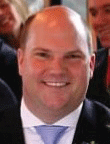Alumni Council Spotlight: Restoring the Great Debate

Scott Hague
Wonderful debate can be an extremely enriching and fulfilling pursuit. In our communities, academic environments, places of work and families, taking time to view any discussion through an opposing lens can be enlightening and, yes, fun. For some time, we have all heard about the narrowing of our political and social scope because of self-serving social and news media. Particularly for Colgate, I applaud the University’s efforts to restore a debate society and encourage more, not less, rigorous debate on campus, both in the classroom and the social realm.
I had the opportunity to meet my first-year roommate well before stepping foot on campus. We were introduced by a mutual friend, who met him at a summer camp at the end of our high school junior year. It turned out that we had both decided to apply early decision to Colgate, had a strikingly similar physical appearance (though he is much better looking) and were both accomplished, or at least very active, in debate.
We met again at a debate tournament in the fall of our senior year of high school in Des Moines, IA, where we were arguing radically different cases, and discovered our radically different political views. Upon reuniting in the lobby of Dodge Hall the first night of our Colgate careers, we immediately became the best of friends despite that fact.
The fall of our first year was also the year of a presidential election. After rigorous debate, we co-authored an article in the Colgate Maroon-News about how despite our opposing historical perspectives, we both supported the same candidate (although we eventually voted differently). At the risk of alienating my family, who was convinced that this liberal arts institution had radicalized me, he and I both had a long call with my father and older brother debating the merits of that decision—a phone call I will always remember, not because it was contentious, though heated at times, but because it was… fun.
I found my time at Colgate to be extremely rewarding. On campus, some of my finest memories were in Professor Kraynak’s classroom, where a group of loyal students from opposing sides of the political spectrum actively sought out his courses repeatedly because they were so intellectually engaging. Not surprisingly, some of his best (clearly, not me) and most loyal students were political polar opposites of him. Off campus, my experiences were no different. Great debates over politics, sports and music, among other things, shaped my college experience. To this day, we maintain an email chain among six of my closest Colgate friends (three left, three right) debating any number of topics, that is active almost daily, and on good topics hourly.
In my professional life, I have encouraged teams in preparation for a meeting to take the view of a firm competing for our business. Often, as we did back in high school preparing for a debate, we will do a mock pitch to allow for critique and improvement. Taking the time to think about an opportunity through that lens makes you more prepared, more aware and in many cases more respectful of the competition.
That has generally been my experience with a great debate. The practice of being forced to look at and argue the merit of both sides of an issue is educational and enlightening. It also has the additional benefit in many cases of diffusing the emotional elements of a discussion. It is hard to say that there is a solution in this time of tribalism and extreme partisanship, where views are too often shaped by self-serving narratives and sound bites, but I have to imagine a good place to start is a debate. I’ll take the opposing side.







